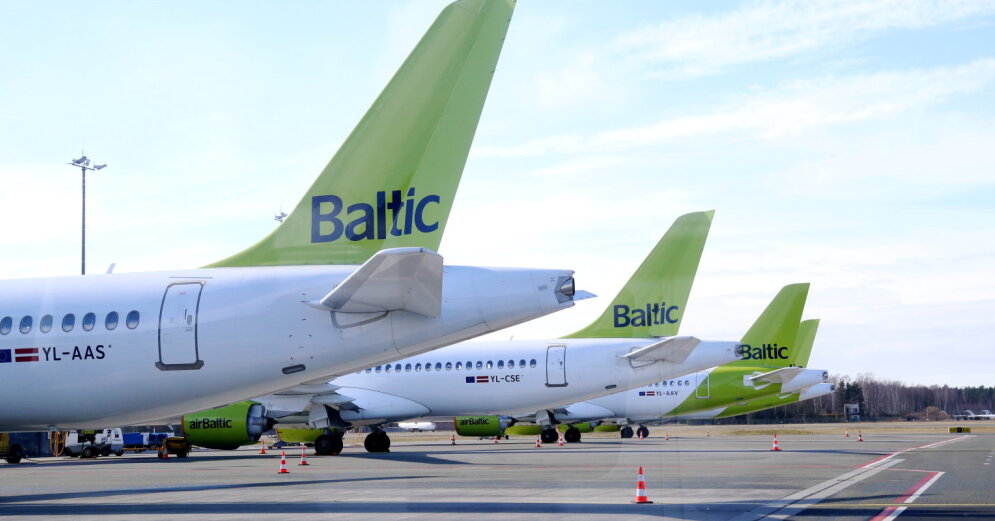Airlines »airBalticThe operating negative cash flow is currently 3.5 million euros per week, and if the situation remains bad and it is not possible to fly, the amount of funds available to airBaltic will run out and new funds may be needed in September, at the Saeima Public Expenditure and Audit Committee meeting. said the head of the company Martins Gauss.
–
Content will continue after the ad
Advertising
–
However, according to him, aviation experts predict that in the second quarter of next year the market will begin to recover and no additional money will be needed. For the time being, our cash flow shows that the replenishment is not necessary, Gauss pointed out.
“In the spring we will see how the situation develops and we can tell if the industry is recovering as expected. If we see that the next wave is coming and the situation does not change, then spring could be a time when we can start thinking about business plan changes and whether it will be necessary. Also, seeing that the situation is not improving, the company will consider how to reduce fixed costs by extending the period during which the company has enough money.
If the situation does not improve, it is planned to reduce costs by laying off additional employees, taking into account the real reduction in activity. This year, the number of employees has already been reduced by 700. If the number of employees were further reduced, it would be even more difficult to resume operations on any scale in the spring, when the market will recover.
airBaltic’s fixed costs amount to approximately EUR 182 million (EUR 3.5 million per week) per year when in hibernation – these are costs that are independent of whether or not aircraft are flying, said airBaltic board member Pauls Cālītis.
He emphasized that in times of crisis, flight revenues must outweigh direct variable costs. Passenger load factor must reach 30% to cover the direct variable costs of the flight. The current passenger load factor in the period from May to September reached 35%. this means that at least the variable costs are covered, said Cālītis.
At the same time, he emphasized that currently airBaltic’s business plan has not changed, the company plans to reach 10 million passengers in 2025, a turnover of almost a billion euros and increase the number of employees to 2,500.
Representatives of the company forecast that 43 thousand passengers will be transported in November, but 63 thousand passengers in December, the total number of passengers transported this year reaching 1.349 million, which is 73% less than in the previous year.
Representatives of the company forecast that the revenue will decrease by about 73% to 136.3 million euros, and the number of used aircraft – decreased from 35 in December last year to 11 in December this year.
Inese Kalvāne, a member of the State Audit Office, informed that the SAO is conducting inspections on the allocation and use of Covid-19 support, and it also includes questions on the allocation of airBaltic, Latvian Air Traffic and Riga Airport.
The airBaltic question explains the answers to the following questions – reasonableness, decision-making, supervision, the SAO will assess whether the requirements for the purposes and how they are achieved are defined.
The SAO has done most of the work, but it is not allowed to disclose the conclusions until the end of the inspection. The inspection is planned to be completed in March, when the SAO also plans to inform about the findings.
The EC requires the state to invest in the airline on a market basis and this is demonstrated over a period of 5-7 years. One way to prove that the investment was made on a market basis is the initial public offering of the shares at the IPO. The company has submitted its plan to the Ministry of Transport for consideration, and the plan envisages offering the company’s shares on the public market within 2-3 years, Gauss explains.
“Under this plan, the State could recover part of its own funds by selling part of the shares, while the shares that would remain at the disposal of the State would have a monetary value and would be quoted on a regular market. What are the consequences if the process does not take place? “airbaltic went through 2011-2014, a restructuring plan would be carried out, which was agreed with the EC and airBaltic was subject to additional sanctions, obliging to reduce the number of fleets, capacity and other negative consequences,” explains Cālītis.
There are currently no restrictions on how much interest will remain at the disposal of the state in the future, the most important thing is that the company will be able to return 250 million euros to the state either in monetary terms or for shares with a defined market value, Gauss emphasizes.
One of the conditions on the part of the EC is that the state reduces its participation to the level it was before the crisis, in this case 80%. In theory, if the state remains 80% owned, from the EC’s point of view, this would not be a big problem.
–


